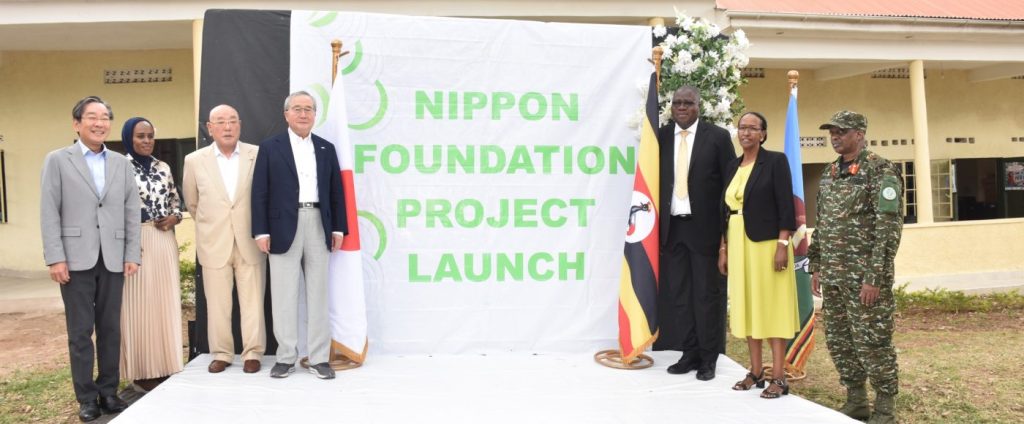Uganda has launched a new Japan-funded project designed to rehabilitate and reintegrate war-affected veterans and injured servicemen and women through psychosocial support and vocational training.
The initiative, worth USD 478,577 and financed by the Nippon Foundation, was unveiled on Thursday by the Minister of Defence and Veteran Affairs, Hon. Jacob Marksons Oboth, at the Defence Forces Rehabilitation and Vocational Centre in Mubende.
Operating under the program “Consolidating Physical and Psychosocial Services at Mubende Rehabilitation Centre and Establishing a Veterans Skilling Centre in Kakiri,” the project seeks to expand rehabilitation services, strengthen counselling, improve vocational training, and promote community reintegration for veterans and their families.
Government Praises Japan’s Support
In his remarks, Hon. Oboth hailed the partnership as a landmark in Uganda’s journey to honour those who have borne the burden of safeguarding peace.
“This project represents a significant step forward in strengthening the welfare and dignity of our veterans and serving soldiers who have sacrificed for the peace and security of our beloved country,” he said.
Reflecting on Uganda’s post-independence upheavals, Oboth noted that the country endured eight changes of government within two decades, leaving deep scars on institutions and soldiers.
He stressed that while Uganda has emerged as a major peacekeeping force on the continent, the wellbeing of veterans must remain a national priority.
“The Nippon Foundation project is a blueprint for inclusive development, a model for civil-military synergy, and a testament to Uganda’s enduring commitment to peace, dignity, and transformation. Let us build as we heal,” he added.
Japan Reaffirms Partnership
Japan’s Ambassador to Uganda, H.E. Takuya Sasayama, linked the project to longstanding cooperation between the UPDF and the Japan Self-Defence Forces, particularly in UN peacekeeping missions.
“I commend my seniors for keeping their word made more than seven years ago, which today has become a reality. This project reflects our shared belief that security is not only about military strength, but also about how we care for those who have borne the burden of defending our nations,” he said.
A Holistic Approach to Rehabilitation
Mrs. Rosette Byengoma, Permanent Secretary of Defence, underscored that rehabilitation extends beyond physical treatment.
“True security is measured not only by military strength, but by how a nation cares for its veterans,” she said, thanking Japan for its continued support.
Mr. Takeju Ogata, Chairperson of the Nippon Foundation, described the donation as a symbol of Japan–Uganda friendship and a commitment to human dignity.
“We are grateful that our Foundation can contribute to the welfare of soldiers injured in war, especially those who served to protect people outside Uganda. I hope for a day when the world will be free of conflict, but until then, we must care for those who continue to be wounded while sacrificing their lives for others,” he said.
He further likened the day’s rainfall to a sign of renewal and partnership between nature and humanity.
Boost for Ongoing Rehabilitation Efforts
Brig Gen Moses Kwikiriza, Commandant of the Defence Forces Rehabilitation and Vocational Centre, welcomed the project as a timely boost.
“Today’s occasion marks a vital step forward in our commitment to care, rehabilitate and reintegrate our injured service personnel and veterans into society. The equipment donated will make a real difference in the lives of those undergoing the rehabilitation program,” he said.
He noted that new facilities and training would modernise and expand the Centre’s programs.
“This effort would not have been possible without the support of His Excellency the President, the UPDF leadership, our Japanese partners, and the dedicated staff and healthcare professionals whose work reflects the highest standards of service and compassion,” Brig Gen Kwikiriza added.
A Legacy of Care
The Mubende Rehabilitation Centre—established in 1986 and later renamed the Defence Forces Rehabilitation and Vocational Centre—has long provided prosthetic limbs, hearing aids, mental health care, and vocational training for war-disabled soldiers.
With the latest support from Japan, the Centre is expected to scale up its services and provide a stronger bridge for veterans transitioning back to civilian life or preparing for redeployment.
The launch attracted senior UPDF officers, Ministry of Defence officials, Japanese diplomats, local leaders, and veteran associations—all underscoring a shared commitment to rebuilding lives scarred by war.
